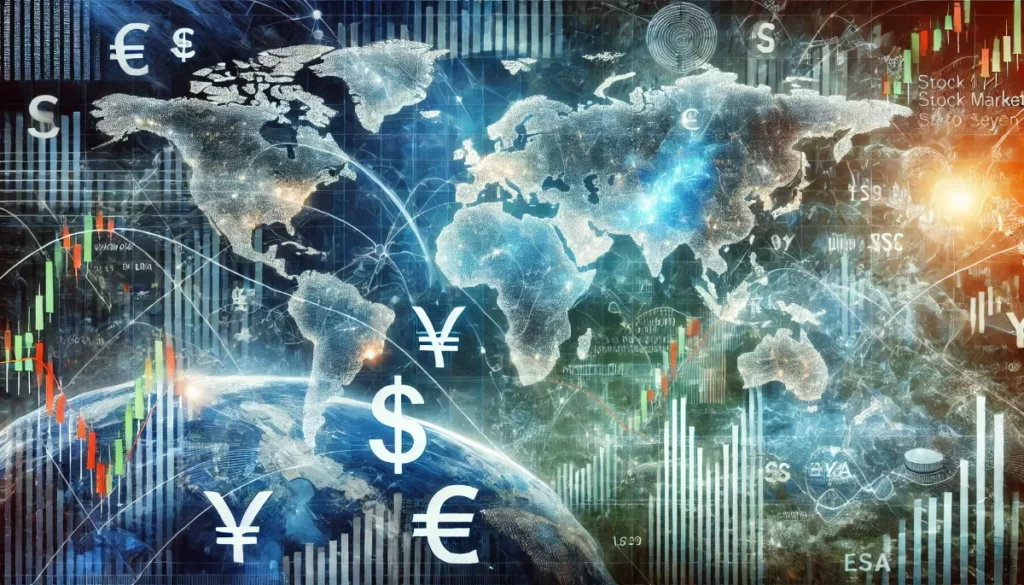Emerging markets are economies that have maintained rapid growth and development; they are, however, not yet considered to have attained the level of stability in economic advancement like developed countries. These markets over the years have emerged as significant players in the global economy, impacting international exchange rates considerably. With their solid economic growth and growing share in world trade, emerging markets are playing an increasingly critical role in currency exchange fluctuations. This article by Toofan Trading Academy explains the role of those markets in international exchange rate determination and mechanisms through which these influence volatility in the prices of currencies.
1. The Characteristics of Emerging Markets
The emerging markets include but are not limited to China, India, Brazil, Russia, South Africa, Mexico, Turkey, and Indonesia. All these countries have become very attractive to international investors due to their high level of economic growth, abundant natural resources, a large and growing population, and rising purchasing power. In spite of the improvement of these economies, they are still susceptible to economic downturns, political instability, and poor infrastructure.
2. Impact of Emerging Markets on Demand and Supply of International Currencies
The contribution that the emerging markets make towards international currency demand and supply is very significant, hence driving their ever-increasing share in world trade and high level of imports and exports. A number of these nations are leading exporters of raw materials such as oil, gas, metals, and agricultural produce. Their export products are usually quoted in foreign currencies like the US dollar and the euro, and changes in their trade volumes can significantly affect international exchange rates.
a) Increasing Demand for Foreign Currencies
A growing economy experiences a growth spurt in which it develops an appetite to import goods. This automatically means that it needs foreign exchange, like the dollar or the euro, whose value then starts appreciating. For example, during the last couple of decades when China’s economy was growing rapidly, its demand for US dollars increased drastically as it had to import raw materials and capital goods.
b) Impact on Local Currencies and Currency Pairs
Such changes in developing countries usually come down to sharp changes in local currencies, which can be a reason for the indirect outcomes of fluctuations in exchange rates of other currencies. For example, the years-long decline of the Turkish lira has already brought visible changes not only to Turkey’s national economy but also to such currency pairs as EUR/TRY and USD/TRY due to high trade turnover with European and Middle Eastern countries.
Read More: The Impact of International Trade Relations on Forex Exchange Rates
3. The Role of Foreign Investment in Currency Fluctuations
Foreign investment inflows are one of the major determinants for exchange rate fluctuation in emerging markets. Because global investors are in pursuit of profitable opportunities in emerging markets, FDI and portfolio investment in emerging markets have increased manifold. Yet, this trend is often reversible as, on account of economic and political instability, the same investments can lead to massive outflows and hence have a telling impact on the exchange rate.

a) Capital Inflows and Appreciation of Local Currencies
As foreign investors enter the emerging markets, demand for the local currencies increases, hence strengthening their values. Such capital inflows may assume forms of long-term investments in infrastructure and production or short-term investments in financial markets.
b) Capital Outflows and Depreciation of Local Currencies
What happens in the event of a crisis is that investors immediately withdraw their assets from the emerging markets into safe havens of more secure currencies, like the U.S. dollar and Japanese yen. This can then cause a rapid local currency devaluation. A situation of crisis in Turkey, for instance, led foreign capital outflow and steep turmoil in the value of the Turkish lira in 2018. This turmoil had direct implications for the price action on USD/TRY and EUR/TRY.
4. Influence of Economic and Monetary Policies of Emerging Markets
The economic and monetary policies of emerging markets directly influence the international exchange rate. Central banks of those countries may raise their interest rates to maintain inflation below the mark or to make their local currencies strong, in order to bring volatility in the forex market.
a) Interest Rate Hikes and Strength of Local Currencies
This is because increasing interest rates by the central banks in emerging markets attracts foreign investors, hence raising demand for local currencies. Higher interest rates usually result in a strong local currency, in turn affecting international exchange rates.
Read More: The Role of Interest Rates at Times of Fluctuations in Global Currencies
b) Interest Rate Cuts and Weakening of Local Currencies
On the other hand, a rate cut may lead to foreign capital outflow and depreciation of local currencies. Changes in monetary policy also indirectly affect the value of other currency pairs.
5. Political and Economic Risks in Emerging Markets
Political and economic risks in emerging markets are basically the factors capable of causing sudden fluctuations in international exchange rates. Political instability, corruption, sanctions, and changes in government policies shake investor confidence and bring about capital flight.
a) Political Instability and the Impact on the Local Currencies
Most of the emerging markets suffer from political instability and sudden change in policies that may precipitate a sharp decline of local currencies. Recently, the political crisis in Brazil has prompted the strong depreciation of its currency, Brazilian real, and consequently, currency pairs both with the U.S. dollar and the euro.
b) Effects of Sanctions on the Exchange Rate
These economic sanctions placed on some of these emerging markets make the currency exchange rate plummet to a very large extent. This is because sanctions always dampen access to foreign currency and reduce international trade, thus decreasing the value of the local currency.
6. Conclusion
Emerging markets, as major drivers of the world economy, highly contribute to making international changes in exchange rates. These markets determine the demand for and supply of foreign currencies, the flow of foreign investments, and changes in monetary policy. As a result of increases in actual and relative economic power, the rise of the developing nations places great demands on worldwide economic resources. In respect to foreign exchange traders and investors, it will be essential to monitor the latest economic and political situations of emerging markets closely and accurately predict currency volatility to take advantage or reduce risks of these markets.

Leave a Reply